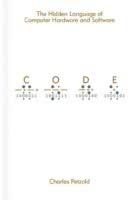As now I travel to work via underground, I have more time to read. The first book I've fully read is Code, from Charles Petzold, and I really encourage anybody wanting to learn how computers evolved up to late 90s to go grab it.
Review

Title: Code: The Hidden Language of Computer Hardware and Software
Author: Charles Petzold
Although the description of the book is a bit dumb, the title hints the contents: Learning from where do computers come, at both hardware level from morse code and the telegraph to current computers, and software level from raw circuit-based "programming" to assembler and high level languages. One note needs to be made, as the book was written in 1999 some technologies have changed (and even dissapeared), some numbers are obsolete and in general you shouldn't expect the book to teach you how an SSD hard drive work, but more instead a deep but general overview of the fundamentals of a computer.
The hardware level is what takes most of the book, starting with morse code and the telegraph to teach us basics of both data transmission and from where the integrated circuits come. This is the biggest and I guess hardest part to learn, because it is like taking your first half of the first year of university of computer science inside a book: Electronics, circuits, boolean algebra, binary, octal and hexadecimal systems and conversions... At least in Spain you learn this contents in 3 different subjects, so be prepared for some heavy circuit diagrams and calculations to repeat if you don't already know the topics. It is also the most beautiful part and where you will learn most of the amazing evolution path to personal computers.
The softwar level sadly suffers from having much less space, and while the internals of how old operating systems worked, how to manage files or input and output devices or how to draw pixels at old monitors are really interesting, I feel like it could have had a few more chapters digging more into details of old OSes, more old programming languages, etc. We learn about Assembler, C, LISP and a few others but very briefly (except ASM). Also some chapters are a mixed bag, where you are told about screen resolutions and then jump to digital audio, then disk storage... surely it is all I/O but I would have prefered a clear separation. That said, it is still great and I've learned some interesting facts.
Nostalgia also kicks in for me, but having lived the AMSTRAD PC/W & CP/M era, MS-DOS and the surge of GUI-based operating systems, I really enjoyed learning how simpler computers designed the hardware interruptions mechanisms, loaded the BIOS, why Macintosh was always different from PCs and other low-level details not usually taught anywhere else (at least condensed and in a simple language).
Really recommended read, mandatory if you like to know how things work under the hood. And also curious to read 17 years later and see how some technologies have been surpassed and their limits solved.